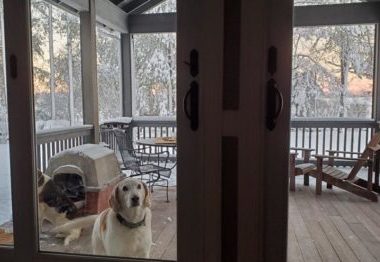
The result of the winter storm that hit central Virginia this past week has been harsh – so many people without power, without heat, without water,…. It is in times like this that I marvel at the awesome compassion of humanity in caring for its own — the amazing teams of lineworkers, teams that clear the roads, remove the downed trees, set up emergency warming shelters and food and water distribution centers; neighbors that reach out to help each other survive and thrive. Some communities now even provide shelters for the companion animals belonging to community members in the human shelters! The systems we have developed to help humans in need are simply amazing. That doesn’t mean there is no suffering. There has been plenty. But the loss of human life in circumstances that might otherwise take a heavy toll, is minimal. It is in these times that we often see the very best of human compassion.
Nature is a little more challenged in such times. Harsh winter storms commonly result in the loss of life for those too weak to bear it – the old, the sick, and the injured. Nature has evolved and adapted to the challenges of life in the wild. Healthy animals have evolved to have what’s needed to survive – insulating fur or feathers, hibernation for some, stored food reserves, an ability to seek out shelter, to do what nature calls them to do. In some cases, our awesome human compassion even reaches out to assist our wild friends as we put out food for the birds and other wildlife.
But the situation for owned animals is different. Some companion animals are exquisitely cared for by their owners who understand the needs of their animals and have the means to provide for those needs. But many who own animals simply do not and cannot meet the needs of their animals.
In breeding animals, humans have stripped away nature’s survival features. People acquire dogs that lack the natural insulation and body styles adapted to our climate. Owners are commonly unable to provide an adequate quality food source or basic veterinary care – much less urgent care. Following old cultural norms, they then tie or confine their animals outside with minimal shelter, depriving them of the ability to seek better shelter, food, or water or to generate warmth from activity.
This leaves animal advocates to face the challenging question of how to be a voice for animals, considered to be property, that are suffering from neglect and misery that is either 1) not in clear violation of any enforced laws, 2) for which there is no charitable assistance available, and/or 3) simply not found, reported, or identified? Is it in our human nature to disregard the needs of these animals that have been brought into human ownership? For many that answer is no. But options for aiding animals in need are severely limited, largely due to the legal status of animals as “property.”
There are no easy answers to this problem. It has been the bane of those working to help companion animals in our communities for generations. The essence of the problem lies in our cultural habits and the legality of owning animals as inanimate beings. While the awareness and compassion for the needs of companion animals continues to grow, the laws that too often prevent aid and the harmful cultural habits are still strongly entrenched.
In closing, I don’t have solutions to offer, but I invite readers to think about these challenges and what kind of cultural changes might have the potential to extend our compassion and voices to the animals suffering in the shadows of human ownership. If so inclined, I hope you might share your thoughts and ideas here.
I offer up my enormous gratitude to all those who offer their compassion and assistance in whatever ways they can. As always, I wish you peace, joy, and well-being!